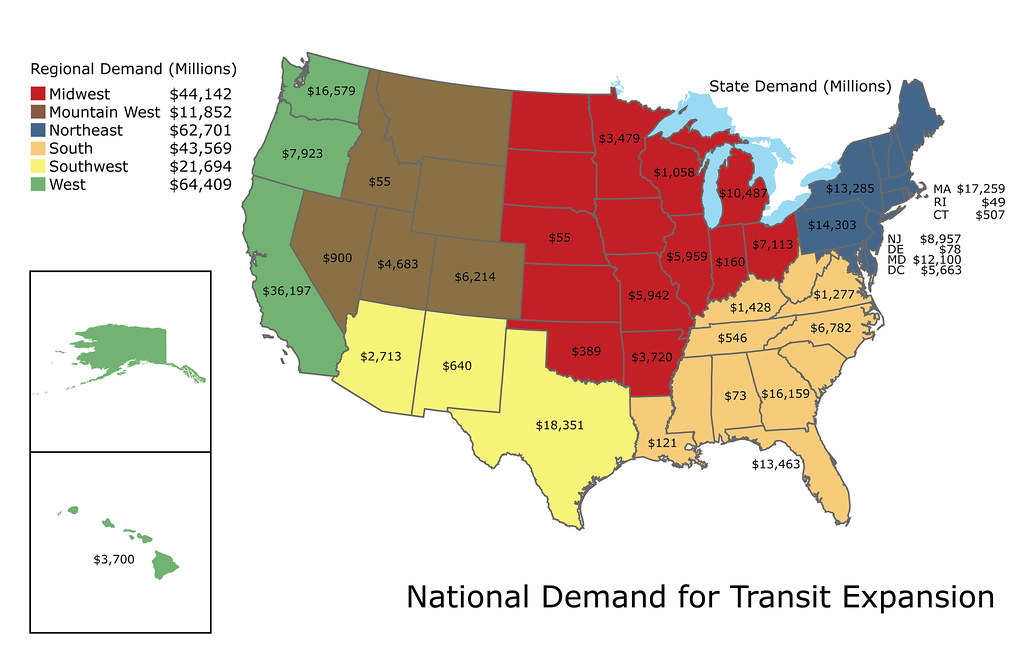A report called
Jumpstarting the Transit Space Race was released today by my day job organization about the backlog of capital fixed guideway transportation projects in the United States. The total capital cost for almost 400 subway, commuter rail, light rail, streetcar and BRT projects is estimated at $248 billion dollars. If that seems like a lot of money, it is. In fact, under the current capital funding mechanism of New Starts, this would take 77 years to fund if projects were funded 50% locally and 50% federally. That's a pretty messed up system.

Here are a few select quotes from the report folks might find interesting:
Americans took 10.1 billion trips on transit in 2007, saving 1.4 billion gallons of gasoline – the equivalent of a supertanker leaving the Middle East every 11 days.
“We’re loving our transit systems to death today,”(4) Congressman Peter DeFazio (D-OR) told the U.S. House in a debate early this summer.
Roger Snoble was among those to testify. “In its efforts to exercise due diligence over federal funds, the Federal Transit Administration has developed a system so complex, so replete with reports and analyses and so fraught with delays and schedule uncertainties that it now obstructs
one of the agency’s fundamental goals to assist urban areas in building critically needed transit systems in a cost-effective manner,” Snoble told the House Subcommittee on Highways and Transit.
A 2005 survey conducted by the U.S. Department of Housing and Urban Development and the U.S. Census Bureau found that only 54 percent of American households have access to bus and rail transit, and only 25 percent have what they consider to be a “good option.”

 Here are a few select quotes from the report folks might find interesting:
Here are a few select quotes from the report folks might find interesting:

12 comments:
I can understand why LA, Atlanta, and Seattle are so high on the list--they're large cities that have underinvested in mass transit in the past and need to expand their systems dramatically. But why is Boston so high up--#2, with $17b (is that number right?) in requests? That seems like it would translate into 3-5 new lines. Can that be right?
Note that $248 billion is just about one five-year highway bill. And yes, it'd definitely true that the FTA's long, complicated bureaucratic process often increases the cost of a project significantly by adding delays and lots of studies.
Compare the due diligence for transit funding with the due diligence for say... oil wars and bank bailouts.
Has anyone tried to compare the amount of process demanded by the Federal Transit Agency to the amount demanded by the likes of the Federal Highway Agency?
With that sort of cumbersome process, it's not surprising that some transit-line builders have gone the earmark route, which makes them seem like pork barrel. John McCain famously got indignant as to how Minneapolis's Hiawatha Line got funded, which was partially by earmark.
Boston has plans on the books to build a connection between North and South Station under Boston but also plans for the Silver Line Busway tunnel. Those are two large projects they believe are needed but also cost a LOT.
In the report Loren there is a comparison between a highway project and a rail project that started at the same time. The road project is under construction and the rail project is still in alternatives analysis.
I thought 5.7 Billion for Chicago is about what is needed just to bring the CTA's current 100 year old L system up to a state of good repair. Don't they need twice that to even begin thinking about expansion?
Yeah. The report says that $248 is just for expansion. It also states more is needed for rehabilitation and expanding bus services. I don't think we've even scratched the surface of how much is REALLY needed.
I'm still pissed that BRT is even being given legitimacy. Why aren't we like the Europeans? And why should we even spend the money on bus tunnels?
I'm still pissed that a "rapid bus" is counted as a "fixed guideway". It's not. Furthermore, there should not be any more busways. I know, because in these situations, I clearly prefer rail, not an imitation that's "rail on rubber tires" and "just like rail, but cheaper".
Thelonious, all cities in the US have underinvested in transit. The one that has invested the most, New York, still lags behind Europe and East Asia in transit modal share.
Boston's backlog:
(1) A problem dating back over a century: the northern and southern long-distance rail terminals aren't connected.
(2) A problem dating back decades: the streetcar system was largely dismantled and needs to be reinstated through old, very high density neighborhoods. This is very expensive, though still a lot cheaper than the Silver Lie BRT proposals. The most important transit projects in Boston are the Green Line extensions to Somerville and Medford.
(3) A more recent and very common problem: there's a substantial deferred maintenance backlog.
I'm guessing the $248 billion is with the FTA mandated inflation rate of 2.7% which is now causing most projects to cut costs to an extreme with the most basic platforms, maintenance facilities, etc. considering the construction cost inflation is in the 10-15% range. It will be over $500 billion by the time all of that gets built even if that happens in the next 10 years (if miracles are possible).
Post a Comment